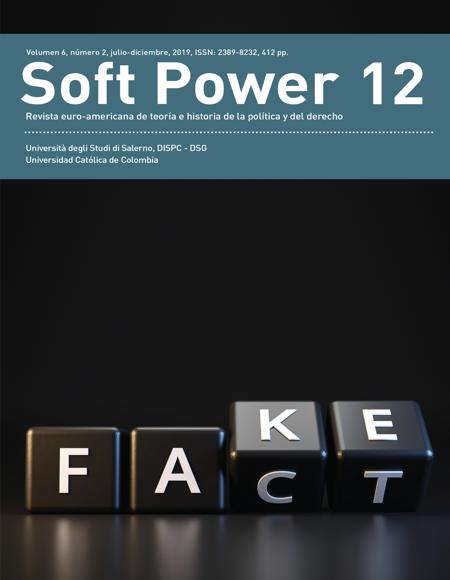Abstract
Fake news, Post-Truth are now entries into the ordinary language of contemporary politics to denote - with anxiety and concern - the definitive rupture of the relationship between truth and politics. A relationship that has never been idyllic and that cannot be, constitutively, idyllic, but which now seems to have reached a point of no return. Glossing the reflections of Hannah Arendt in Truth and Politics and pointing out two areas of “political licence” - that is, two areas where, inevitably, politics cannot be judged on parameters of truth - this contribution aims to treat the weakness of shared truths not as a cause of the crisis of democracies, but as a symptom of a more radical problem, an extreme subjectivism that leads to loneliness and intolerance towards any relationship based on trust.

References
Alagna, M. (2018). ‘Look Down in Anger. L’epoca del ringhio’, Lo Sguardo. Rivista di Filosofia, 27.
Arendt, H. (2006). ‘Truth and Politics’ in Between Past and Future. London: Penguin Books.
Blumenberg, H. (1961). ‘Weltbilder und Weltmodelle’, in Nachrichten der Giessener Hochschulgesellschaft, vol. XXX, Giessen: Schmitz.
Blumenberg, H. (1981). Wirklichkeiten in denen wir leben: Aufsätze und eine Rede. Stuttgart: Reclam.
Blumenberg, H. (2010). Paradigms for a Metaphorology. Ithaca: Cornell University Press.
Chignola, S. (2018). Da dentro. Biopolitica, bioeconomia, Italian Theory. Roma: Derive Approdi.
Dardot P. & Laval, C. (2014). The New Way of the World: On Neoliberal Society. London: Verso.
Duffy, B. (2018). The Perils of Perception. Why We’re Wrong About Nearly Everything. London: Atlantic Books.
Duso, G. (2007). La logica del potere. Storia concettuale come filosofia politica. Monza: Polimetrica International Scientific Publisher. Own translation.
Fong, B. Y. (2018). ‘Possiamo fare a meno di Twitter e Facebook?’. Retrieved from: https://jacobinitalia.it/13680-2/?fbclid=IwAR1-np0XUAC2tgasDYRcDXsM7LcX48vuLRrdjE0AVVTCptBH06whyLUvBZ0.
Gambetta D. (2018). Datacrazia. Cultura algoritmica e conflitti al tempo dei big data. Roma: Nero Editore.
Han, B-C (2017). Psychopolitics. Neoliberalism and New Technologies of Power. London: Verso.
Hauriou, M. (2004). ‘La science sociale traditionelle’, in Ecrites sociologiques, Paris: Dalloz.
Laclau, E. (2008). La ragione populista, Roma-Bari: Laterza.
Lolli, A. (2017). La guerra dei meme. Fenomenologia di uno scherzo infinito. Firenze: Effequ.
Melville, H. (1972). Moby Dick. London: Penguin Books.
Nagle, A. (2017). Kill All Normies. Online Culture Wars From 4chan and Tumblr to Trump and the Alt-Right. London: Zero Book.
Pellizzoni, L. (2006). “‘Decidiamo insieme!’ Conflitti tecnologici e deliberazione pubblica”, Quaderni di Sociologia, 41.
Scheuerman, W. E. (2004). Liberal Democracy and the Social Acceleration of Time. London: The Johns Hopkins University Press.
Tilly, C. (2002). Stories, Identities, and Political Change. Oxford: Rowman and Littlefield.
Weber, M. (1991). ‘The Social Psychology of the World Religions’ in From Max Weber: Essays in Sociology. Abingdon: Routledge.
Ziccardi, G. (2019). Tecnologie per il potere. Come usare i social network in politica. Milano: Raffaello Cortina.














